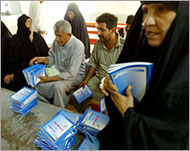Australia expands Iraq oil inquiry
The Australian government has agreed to broaden an inquiry into the involvement of the country in the Iraq oil-for-food scandal to include a probe into the activities of BHP Billiton, the world’s largest diversified mining company.

Philip Ruddock, the attorney-general, said the inquiry initially set up to investigate $220-milion in kickbacks allegedly paid to the Saddam Hussein government by monopoly wheat exporter AWB could now turn its sights on BHP.
The head of the inquiry, retired judge Terence Cole, requested the broader authority after hearings now in their fourth week found evidence of a multi-million dollar wheat shipment funded by BHP a decade ago and which may have been illegal under UN sanctions against Iraq.
The suspicions centre on a joint venture company set up by former BHP executives, Tigris Petroleum Corporation.
Cooperation expected
Ruddock said the government would widen the powers invested in Cole to permit him to look into possible criminal activity involving BHP Billiton and Tigris Petroleum.
“The terms of reference have been amended in accordance with Mr Cole’s request and in the form proposed by him,” he said in a statement.
BHP Billiton has said it would cooperate fully with the inquiry.
According to evidence heard at the inquiry last week, the Tigris affair involved efforts to recover a debt linked to a 1996 wheat shipment to Iraq that was funded by BHP in an attempt to win petroleum exploration rights in the country.
Since UN sanctions prohibited direct transactions with Saddam’s government, BHP shifted the $8 million debt to Tigris Petroleum, which in turn hired AWB to help recover the money from Iraq for a US$500,000 fee.
Wheat prices
 |
|
Proceeds of the oil deal were |
AWB retrieved the money by progressively raising the price of wheat shipments under two UN oil-for-food contracts, the inquiry was told.
The scandal surfaced last year with the release of a UN probe into the oil-for-food programme under which Iraqi oil was sold and the proceeds used to provide food and other humanitarian needs to the country.
The inquiry accused AWB of paying $220-million in bribes to Iraq to secure $2.3 billion in wheat contracts under the programme.
These were the biggest payments made by any of the more than 2000 companies worldwide that the UN report implicated in the scandal.
Denials
Senior AWB executives have denied knowingly paying bribes, saying they believed the cash was paid to a Jordanian trucking company to cover transport of the wheat inside Iraq.
John Howard, the prime minister, on Friday rejected allegations that his government, which controlled AWB until mid-1999, knew about any illegal payments in Iraq.
He said: “We frankly believed all along that AWB was an organisation of complete integrity.”
Howard said he, his ministers and department officials were prepared to appear before the inquiry if asked to do so.